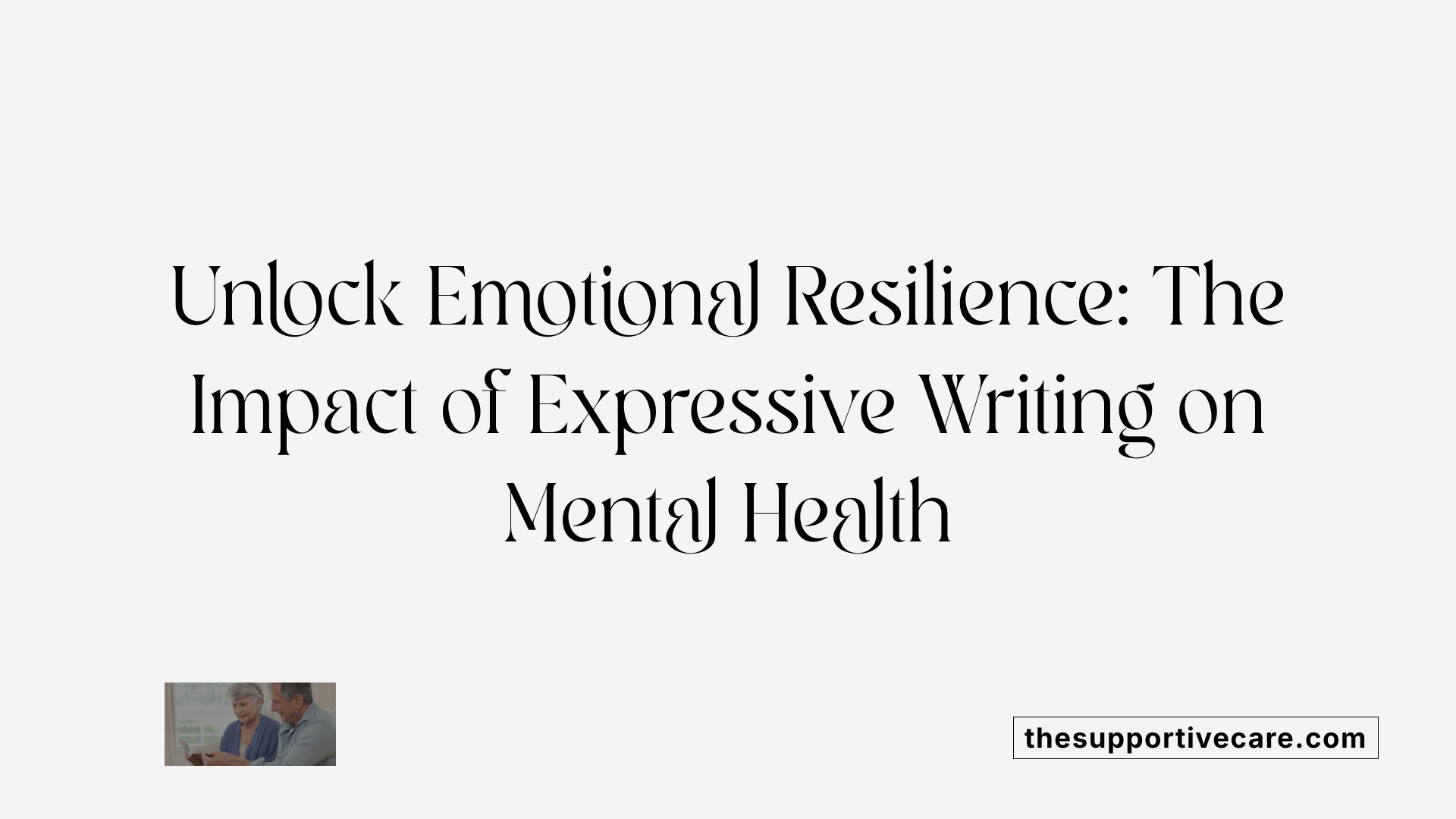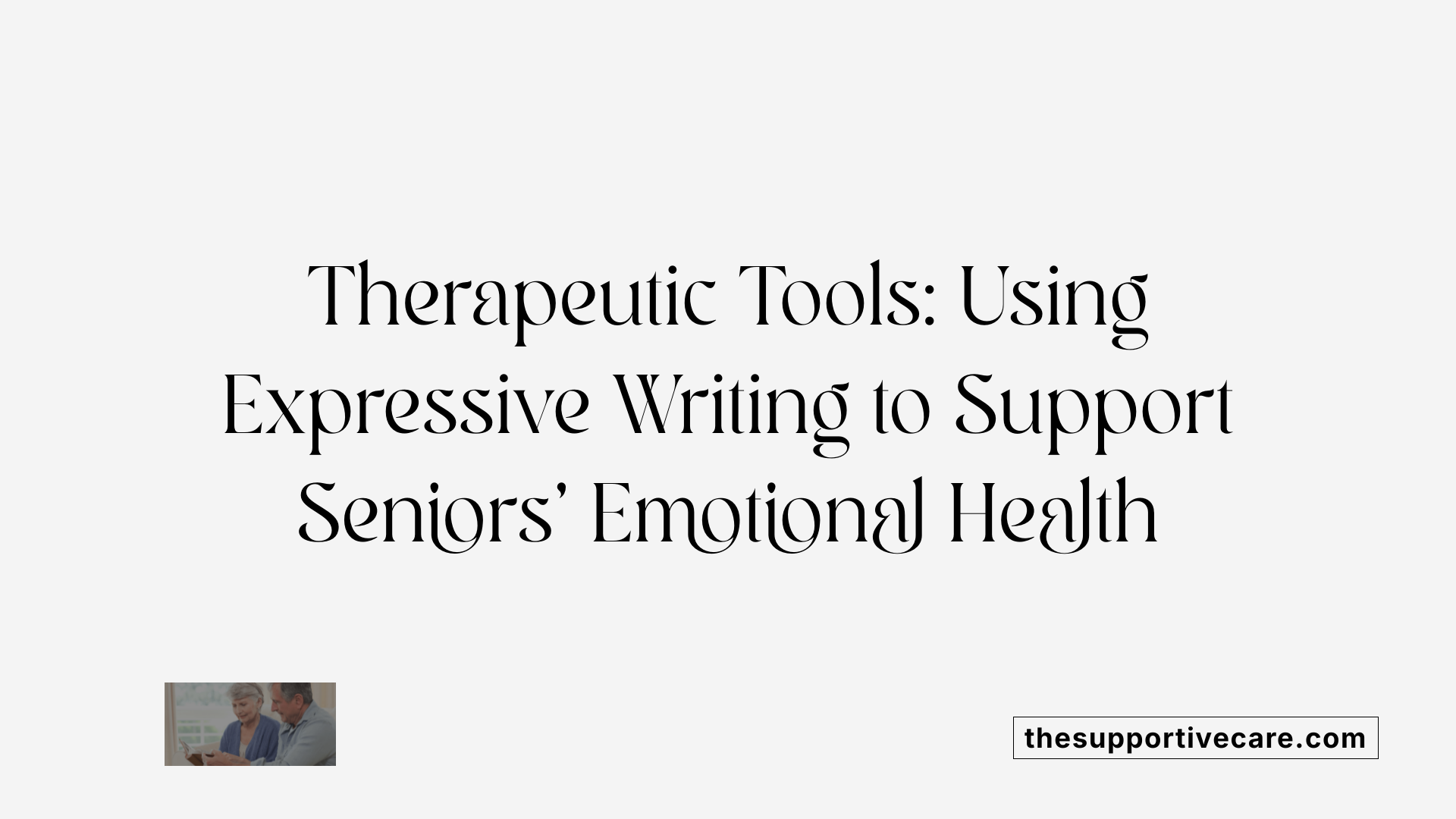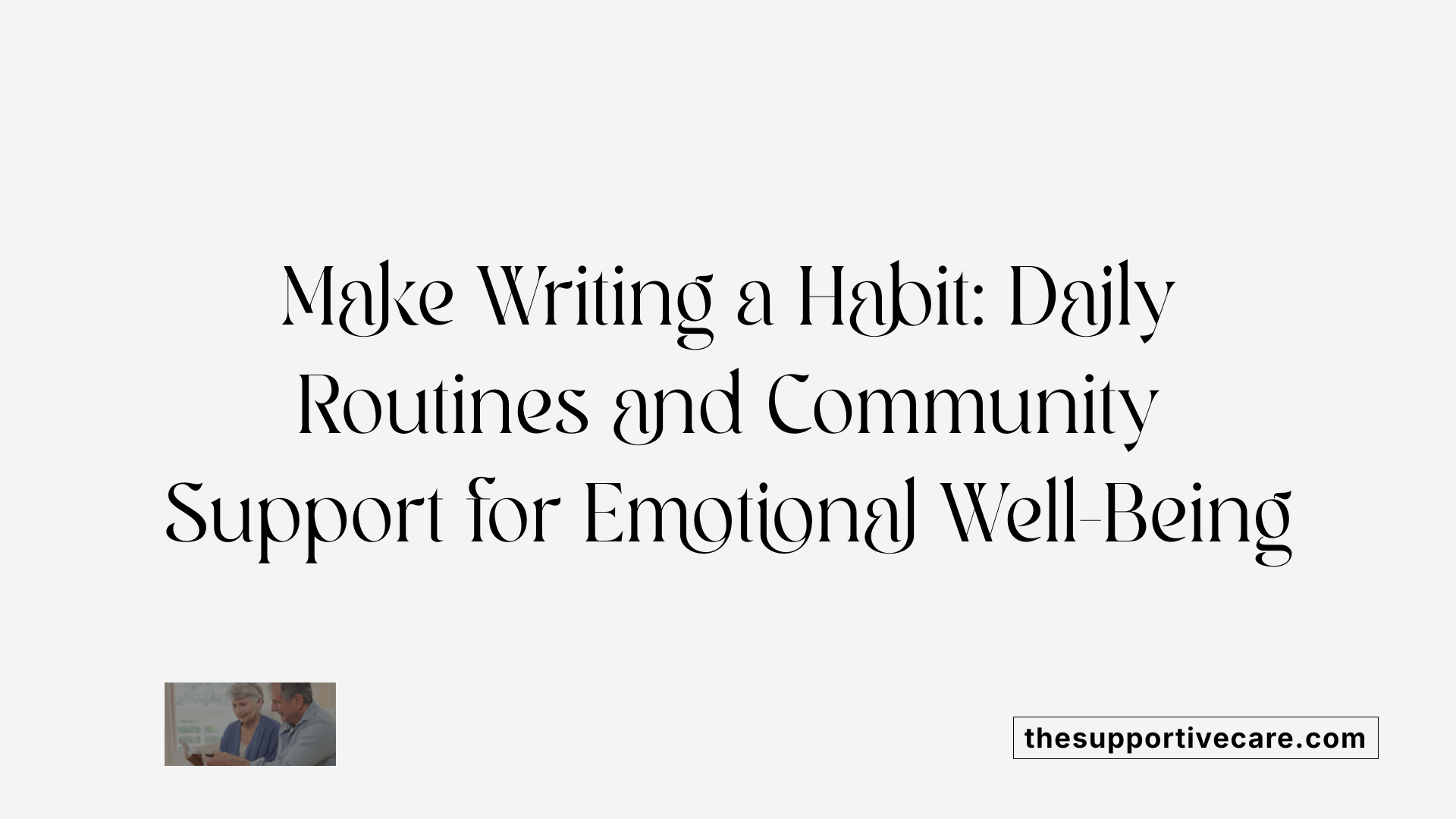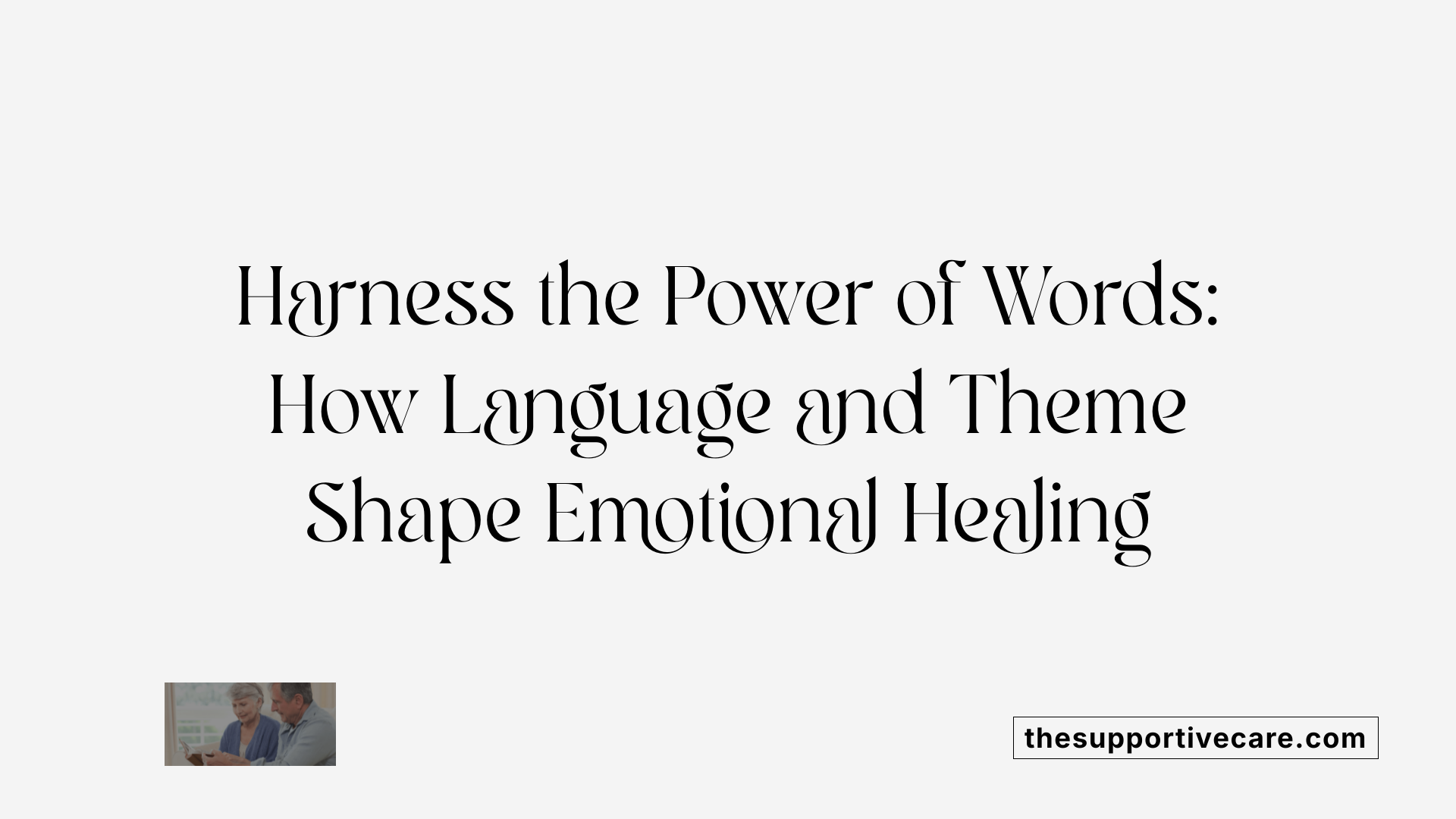The Transformative Potential of Expressive Writing for Older Adults
As individuals age, maintaining emotional resilience becomes increasingly important for overall well-being. Recent scientific insights reveal that expressive writing—an accessible, low-cost, and adaptable intervention—can significantly enhance emotional health in older adults. This article explores how putting pen to paper allows seniors to process emotional experiences, foster resilience, and ultimately improve their quality of life.
The Foundations of Emotional Benefits from Expressive Writing
What are the benefits of expressive writing for emotional health in older adults?
Expressive writing plays a significant role in boosting emotional well-being among older adults. When individuals write about their traumatic, stressful, or upsetting experiences, they often experience a sense of relief and emotional release. This process helps them confront deeply held feelings, which can lead to decreased feelings of stress and anxiety.
Research highlights that engaging in heartfelt, detailed writing about personal challenges can foster a greater sense of self-awareness and resilience. For older adults, this can translate into a stronger capacity to cope with life's difficulties, boosting overall mental health. Writing about emotional experiences encourages reflection, helping individuals find meaning in their struggles, and fostering a more optimistic outlook.
Beyond psychological benefits, expressive writing is associated with tangible physical health improvements. Studies have shown reductions in blood pressure, fewer visits to healthcare providers, and enhanced immune functioning following regular expressive writing sessions. These benefits are linked to the use of positive emotion words and causal language within writing, which help reorganize emotional experiences and promote healing.
In addition to targeted therapeutic effects, creative and gratitude journaling can reinforce positive feelings and a sense of purpose. Incorporating expressive writing into daily routines supports emotional resilience, helps manage negative feelings, and ultimately contributes to a better quality of life for older adults. Overall, expressive writing is a valuable, accessible approach to promoting emotional health and physical well-being in later years, especially when combined with other supportive practices.
Scientific Evidence and Research Backing Expressive Writing
What scientific research supports expressive writing as an effective intervention for emotional health?
The scientific foundation for expressive writing’s benefits stems largely from the pioneering work of Dr. James Pennebaker and his colleagues. His studies demonstrated that expressive writing about traumatic or upsetting experiences over multiple sessions leads to improvements in both mental and physical health. For instance, participants who wrote about their deepest emotional struggles showed reduced visits to health clinics, improved immune function, and better mood.
Supporting this, over 2,000 research studies have been published examining various aspects of expressive writing. These studies consistently indicate positive impacts on emotional well-being, stress reduction, and even physical health improvements. Meta-analyses reveal that expressive writing has moderate effects (around 0.47 effect size) on health outcomes in healthy populations, with benefits extending to clinical groups.
Language and content analysis tools like LIWC (Linguistic Inquiry and Word Count) have been employed to assess writing samples. The analysis shows that the use of positive emotion words, causal and insight words, and shifts in pronoun usage are associated with better mental health outcomes. Such linguistic patterns suggest that cognitive processing and emotional expression during writing facilitate healing.
In terms of long-term health benefits, research indicates that expressive writing can lead to reduced blood pressure, fewer days hospitalized, decreased symptoms of depression, and lower levels of physiological stress hormones. Neurobiological studies further support these findings by showing that expressive writing may lower cognitive load, reduce activity related to rumination, and activate the parasympathetic nervous system, promoting relaxation and resilience.
Overall, the extensive body of research affirms that expressive writing is a valid, accessible, and effective approach to enhancing emotional health. Its mechanistic foundation involves facilitating emotional processing, narrative coherence, and cognitive restructuring, making it a valuable complement to other mental health interventions.
Methods and Techniques for Effective Expressive Writing in Older Adults
What are effective techniques and methods of expressive writing or journaling for older adults?
Effective approaches to expressive writing for older adults involve creating a regular routine that encourages consistent engagement. For example, dedicating a specific time each day or week for writing helps establish a habit and makes the activity part of daily self-care.
Focusing on particular themes, such as recalling joyful memories, describing difficult experiences, or writing heartfelt letters, stimulates emotional reflection and personal growth. Using prompts tailored to the individual's experiences can provide direction and inspire meaningful exploration.
Various styles of writing can be beneficial. Journaling, poetry, short stories, and gratitude lists each serve different expressive purposes and can keep the activity fresh and engaging. For instance, gratitude journaling positively shifts focus toward uplifting aspects of life, boosting mood and overall well-being.
To foster emotional release without pressure, writers should be encouraged to write without worrying about grammar, spelling, or style. The goal is authentic expression, which can help process complex feelings and reduce stress.
Starting with short sessions—like just 5 to 10 minutes—and gradually increasing duration helps prevent overwhelm and builds confidence. Incorporating writing into daily routines, such as morning reflections or evening summaries, makes it easier to stick with the practice.
Technology offers additional avenues. Digital journaling apps, online communities, and social sharing platforms can motivate continued participation.
Sharing experiences in group settings, like writing groups or support circles, enhances social bonds and allows feedback, fostering motivation and emotional support.
In summary, successful expressive writing techniques for older adults combine routine, thematic prompts, diverse styles, a focus on authenticity, manageable time frames, and opportunities for social interaction, all tailored to enhance emotional well-being and cognitive resilience.
Understanding How Expressive Writing Enhances Emotional Well-being

How does expressive writing influence emotional well-being?
Expressive writing plays a significant role in improving emotional health by helping individuals process their deepest thoughts and feelings related to stressful or traumatic events. This process encourages cognitive restructuring, meaning it helps reconstruct and organize memories into a coherent narrative, which can lessen emotional distress and promote healing.
Research shows that writing about challenging experiences fosters emotional regulation and resilience. As individuals craft their stories, they often develop new perspectives, reducing symptoms like anxiety, depression, and trauma-related distress.
Language analysis tools, such as LIWC, reveal that the words people choose during expressive writing matter. The use of positive emotion words, causal words, and insight words correlates with better health outcomes. For example, frequent use of positive language can boost mood, while causal words help individuals understand and give meaning to their experiences. Changes in pronoun usage, especially moving from self-focused to more reflective language, often indicate improvements in emotional health.
Long-term benefits of expressive writing include enhanced psychological well-being, better mood, and greater emotional resilience. However, effectiveness varies among individuals, with more emotionally expressive people tending to benefit more. Engaging in expressive writing is a simple, accessible, and low-cost method to support emotional recovery and physical health through emotional processing, cognitive restructuring, and narrative development.
Studies focusing on older adults, including seniors with cancer, have shown that expressive writing delivered via telephone can significantly reduce depression, demoralization, and anxiety. Overall, this form of writing aids in emotional release, promotes self-awareness, and helps individuals construct positive future outlooks.
Application of Expressive Writing in Clinical and Therapeutic Settings for Seniors

How can expressive writing be applied in clinical or therapeutic settings for seniors?
Expressive writing can serve as a valuable tool in therapy for older adults, helping them manage emotional challenges related to aging, illness, or trauma. Structured writing exercises facilitate emotional processing by encouraging seniors to explore their thoughts and feelings about difficult experiences, such as health declines or loss of loved ones.
These interventions are adaptable to various delivery formats. For example, telephone-based expressive writing programs have been successfully implemented, making them accessible for seniors with mobility issues or those living in remote areas. Such programs typically involve regular sessions where participants write about significant stressors or emotional events, guided by prompts or themes.
Research shows that engaging in expressive writing reduces symptoms of depression, demoralization, and anxiety in older populations. It also promotes spiritual well-being and enhances self-awareness, fostering a sense of meaning and resilience.
Effective techniques include reflection on personal experiences, emotional venting, and thematic exercises tailored to older adults’ specific life circumstances. For instance, prompts might focus on coping with health challenges, reminiscing about positive memories, or exploring future goals. Using these methods in clinical settings can support psychological healing, improve mood, and strengthen the overall mental health of seniors.
By integrating evidence-based approaches and customizing exercises to individual needs, clinicians can maximize the therapeutic impact of expressive writing for older adults, promoting emotional well-being and resilience during the aging process.
Physical and Mental Health Benefits of Expressive Writing in Older Adults
What is the impact of expressive writing on mental and physical health in older populations?
Research shows that expressive writing can significantly benefit older adults by reducing feelings of depression, demoralization, and stress. For example, the tailored intervention CARE-Express, delivered via telephone to older cancer patients, successfully lowered depression scores and demoralization, while also boosting spiritual well-being. Participants reported feeling more hopeful and less psychologically distressed even four months after completing the program.
Beyond emotional health, expressive writing has shown promising physical health perks. Multiple studies link it to fewer doctor visits, improved immune function, and lower blood pressure. These benefits are particularly meaningful for older adults managing chronic health issues, as writing helps in emotional regulation that positively influences physical well-being.
However, results vary across different studies. Some research indicates limited effects when expressive writing is compared to activities like memory recall or time management writing. For instance, a study focusing on older adults practicing writing about stressful events found no significant reduction in rumination or improvement in overall well-being. This suggests that the effectiveness of expressive writing may depend on how it is structured and the participant’s emotional engagement.
Overall, expressive writing presents a promising, low-cost addition to health strategies for seniors. When focused on processes that facilitate emotional release, trauma processing, and meaning-making, it can support both mental and physical health—potentially leading to long-lasting benefits.
Expressive Writing During Stressful Times: The Pandemic and Beyond
How can expressive writing help during stressful or challenging times, such as during a pandemic?
Expressive writing offers a meaningful outlet for individuals facing intense stress, uncertainty, and trauma, which are common during crises like a pandemic. Engaging in regular writing about personal thoughts and feelings related to these experiences allows people to process their fears and anxieties privately, reducing emotional overload.
Research by James Pennebaker and others shows that expressive writing can lead to physical and mental health improvements, including fewer doctor visits, lower blood pressure, and enhanced mood. Especially in turbulent times, writing helps organize chaotic thoughts, facilitate emotional regulation, and create a coherent narrative from distressing events.
For many, this practice boosts resilience by encouraging reflection and perspective, transforming overwhelming emotions into understandable stories. It can also foster social connection—sharing insights and experiences post-writing may strengthen bonds and reduce feelings of isolation.
While highly expressive individuals often find it particularly beneficial in managing anxiety, those less comfortable with emotional expression might approach it gradually. Overall, when tailored, expressive writing is a powerful, accessible tool that supports emotional healing and adaptive coping during the uncertainties of a pandemic or other crises.
Incorporating Expressive Writing into Daily Routines and Community Practices

Building consistency and habit formation
Establishing a regular writing routine is essential for reaping the mental and physical health benefits of expressive writing. Older adults can set aside a specific time each day, such as morning or evening, to write for just a few minutes, making it a manageable part of their daily schedule. Creating a comfortable space dedicated to writing, with cozy seating and minimal distractions, encourages a sense of ritual and safety.
Journaling formats and prompts for ongoing engagement
To keep the practice fresh and meaningful, various journaling formats and prompts can be used. For example, freewriting about a memorable childhood experience, expressing gratitude for daily blessings, or reflecting on recent challenges can stimulate emotional processing and creativity. Switching between creative formats like poetry, short stories, or memoir writing can also maintain interest and cater to individual preferences.
Creating social and community-based writing groups
Joining or forming community writing groups provides emotional support, motivation, and feedback. Sharing work in a safe environment fosters connection and reduces feelings of isolation. Virtual groups or online platforms can be particularly accessible for older adults with mobility limitations, allowing them to connect with others and participate from home.
Tips for fostering motivation and privacy
Maintaining motivation involves setting small, achievable goals and celebrating progress. Using special journals or digital tools can add a sense of novelty and personal significance. Ensuring privacy and confidentiality is crucial; using password-protected documents or private physical journals helps create a safe space for honest expression. Encouraging participants to view their writing as a personal and healing process, rather than perfection, promotes continued engagement.
Examples of daily or themed writing exercises
Daily exercises might include a gratitude list, a reflection on a positive moment of the day, or a short story inspired by a favorite object. Weekly themed prompts could explore topics like childhood memories, hopes for the future, or lessons learned from life experiences. These guided activities can deepen emotional insight and foster a sense of purpose.
By implementing these practical strategies, older adults can make expressive writing a natural and rewarding part of their routine. The combination of personal reflection, creative exploration, and community connection helps sustain motivation and enhances overall well-being.
Understanding Limitations and Moderators of Effectiveness in Older Adults
When considering the use of expressive writing with older adults, it is essential to recognize certain limitations and factors that influence outcomes.
Timing plays a vital role; engaging in writing about traumatic events immediately after the incident can sometimes worsen emotional distress. Research suggests waiting at least one to two months post-trauma allows individuals to process their feelings more safely, reducing the risk of increased rumination.
Content of writing also matters. While expressive writing about stressful experiences can be beneficial, it may not be suitable for everyone. Older adults with cognitive impairments or those who prefer more structured or guided therapeutic approaches might find this method less effective or overwhelming.
Individual differences significantly shape how effective expressive writing can be. Those with higher levels of neuroticism or greater experiential avoidance tend to experience more substantial emotional and physical health benefits. Conversely, individuals with lower emotional awareness or more resilience may notice limited gains.
There is also the potential for adverse effects, such as heightened shame or feelings of helplessness, especially if the writing triggers intense memories or unresolved trauma without proper support.
To maximize benefits and ensure safety, tailored approaches are recommended. Incorporating professional guidance, combining expressive writing with other therapeutic strategies, and adapting techniques to individual needs can improve outcomes.
Overall, while expressive writing has shown promise for older adults, understanding its limitations and moderating factors helps in designing effective and safe interventions that genuinely support emotional well-being.
The Role of Language and Content in Maximizing Benefits
 How does language use in expressive writing influence health and emotional benefits? The words and themes chosen during expressive writing play a crucial role in determining its effectiveness. Incorporating positive emotion words, such as happiness or gratitude, helps boost mood and foster a sense of well-being. Causal words like "because" and "therefore" promote understanding of how thoughts and feelings are connected, aiding emotional processing.
How does language use in expressive writing influence health and emotional benefits? The words and themes chosen during expressive writing play a crucial role in determining its effectiveness. Incorporating positive emotion words, such as happiness or gratitude, helps boost mood and foster a sense of well-being. Causal words like "because" and "therefore" promote understanding of how thoughts and feelings are connected, aiding emotional processing.
Insight words, which reveal understanding or revelation, support cognitive restructuring and help individuals gain perspective on their experiences. A shift in pronoun use—from self-focus (e.g., "I," "me") to more inclusive language—can indicate improvements in emotional health and social connection.
Content focus also matters significantly. Writing about traumatic events, but also including reflections on personal growth or gratitude, enhances the therapeutic value. Such content encourages meaning-making and resilience.
Research tools like the Linguistic Inquiry and Word Count (LIWC) analyze these language patterns, showing for example that boosting positive emotion and causal reasoning correlates with better immune functioning, reduced stress, and improved mood. Conversely, frequent use of negative or avoidance language might hinder progress.
Overall, the deliberate incorporation of positive, insightful, and causative language styles helps maximize the health benefits of expressive writing, transforming emotional catharsis into deep personal growth and mental resilience.
Harnessing the Power of Words for Lasting Well-Being
Incorporating expressive writing into the lives of older adults offers a promising path toward enhanced emotional resilience, physical health, and overall life satisfaction. Supported by robust scientific evidence, this accessible practice empowers seniors to process their experiences, find meaning, and foster hope. Whether through structured therapies, community programs, or personal routines, the therapeutic potential of expressive writing is profound and adaptable. As research continues to illuminate the mechanisms and best practices, it remains clear that the simple act of writing can unlock profound improvements in well-being—making it an invaluable tool for aging with grace, resilience, and optimism.
References
- Expressive writing can help your mental health
- Reflections for Elders-Expressive Writing Intervention: A Pilot Study
- Writing for Emotional Wellbeing in Seniors - Number Analytics
- Journaling for Seniors: A Path to Mental Wellness and Emotional ...
- [PDF] Emotional and physical health benefits of expressive writing
- Writing about emotions may ease stress and trauma - Harvard Health
- How Expressive Writing Can Improve Your Emotional and Physical ...
- Expressive writing therapy: Definition, Benefits, and Techniques



































































































